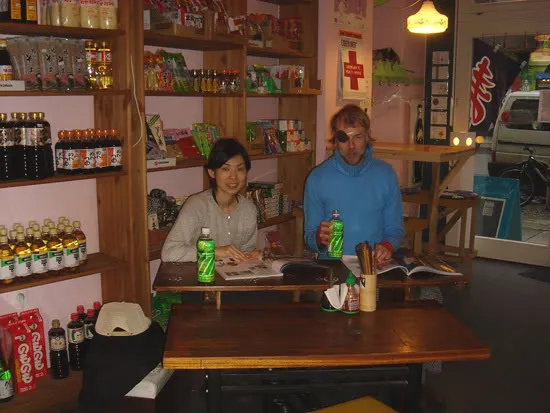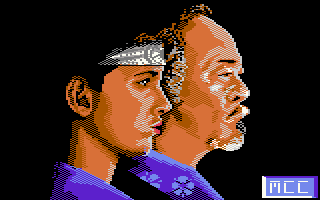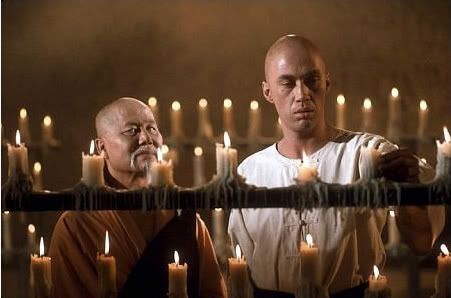So real it's fake. So fake it's real. So real it's real again.
Here's a photo of me and Hisae, yesterday, at the Smart Deli in Berlin. Yumi, who runs Smart Deli, took it.

When I looked at the photo there in the cafe I laughed and said "It looks like one of those Edo Museum-type places!" It looked like a much more Japanese environment on the camera screen than it did just sitting in the room -- a stereotypically "museumlike" one, a simulacrum like the Edo Village supasento in Odaiba, or the restaurant village in the basement of the Umeda Sky building in Osaka.
Yumi looked slightly anxious when I said that. It was almost as though the "authenticity" of her cafe -- a carefully-constructed Japanese environment in the middle of Berlin -- had come into question. Its ability to convince became a sign of a capacity for deception rather than a sign of sincerity. Had she really constructed a museum? Was it all so real it was fake? Or was it, to come 360 degrees, so real it was real?
I find this a really fascinating question. So real it's fake, so fake it's real, so real it's real again. Full circle.

"Daniel-san, your training completed when realize that even music is music." That's me-vs-gutenberg, back in September 2005, here on Click Opera, wittily making fun of John Cage's Buddhist-influenced idea that non-musical sounds are music. Or is he making fun of the kind of rhetoric that opposes two terms in a mutually-defining binary as if they were independent rather than interdependent? And, if so, is he mocking our whole Western schtick of competitive individualism?
John Cage's idea that "silence is music" or Proudhon's idea that "property is theft" make for great rhetoric -- they startle us, they seem to make sense, they're thought-provokingly paradoxical. They also set up a sort of conceptual spectator sport: these terms, which previously propped each other up rather boringly, are now opponents in an exciting boxing match. Which will you root for? Which will win?
The answer is that neither of them can win. The match is rigged. The two terms create and depend on each other. Pure collusion, pure illusion. Nothing will get redefined by setting them against each other, pretending they're opponents.
Look closer. Cage seems to want us to side with silence against music, and Proudhon seems to want us to side with theft against property. Or do they? Examined more closely, these apparently revolutionary statements are only half-revolutions. They don't actually deconstruct the original concepts of music or property. They merely stage a challenge which cannot succeed. A pseudo-challenge.
Whether they only take things half way (180 degrees from conventional definitions), or all the way (360 degrees from conventional definitions -- in other words, all the way back to where they started), paradoxes which oppose the terms of a mutually-defining binary leave us no wiser, and break no new ground. A paradox on its own (a 180 degree statement like "property is theft") just cancels itself out. It's an oxymoron. Take that thought all the way around -- hey, theft, too, is theft! -- and it becomes banal, a re-statement of the original idea it sought to displace. We're back where we started. Just a bit dizzier.

It's a rhetorical, rather than a logical trope. I find myself using it quite a lot. For instance, we all agree that classical music changes more slowly than pop music, right? Or that museums are less vital than discotheques? But with a journalist's instinct for myth-displacement and believe-it-or-not headline-worthiness, I'll take great delight in telling you that pop has become the new conservatory music, and that classical music actually changes quicker. Or that museums are more vital, life-affirming places than discos. But of course my statement depends on you believing -- and continuing, really, to believe -- the opposite. All I want is to momentarily startle you with a counter-intuitive, apparently unorthodox idea. Once you started believing that museums really were more fun than clubs, I'd have to startle you by returning to the original proposition -- that clubs are much more fun than museums.
That's the 180 degree rhetorical trope. But I also use the 360 degree one -- the "music, too, is music" joke. Sometimes it isn't a joke. For instance, this piece, The Japanese are almost Japanese, lays out the idea that Japanese are tourists in their own land (that's 180 degrees), but then takes it (almost) all the way to "the Japanese are Japanese".
This kind of game is fun. I remember a strange prose piece I used to perform with the creative writing group in Aberdeen. Somebody announced "This is the British Broadcorping Castration." (A real slip once uttered by a BBC continuity announcer, apparently.) Then, sitting behind a desk, in the tones of a newsreader, I read out a "local news report" about all the things that hadn't happened that day. "Thirty-two very large cats did not today menace a postman as he went about his rounds, harried by the bombardments of a flock of metal pigeons which were not dropping scrap metal on his head. Furthermore, under no circumstances did the animals then gambol off to harass Mrs Taggart with sinister stentorian whoops. [More of these Dylan Thomas-esque events were reported not to have happened, with greater and greater vehemence of denial, until the last line]: In fact, quite the opposite was the case." Each denial nudged the events described further and further around the compass until they came full circle and became de facto confirmations. They had happened after all.
And, when you think about it, doesn't every denial contain an affirmation of exactly the thing it seeks to refute? The more Yumi's deli isn't Japan, the more it is.

When I looked at the photo there in the cafe I laughed and said "It looks like one of those Edo Museum-type places!" It looked like a much more Japanese environment on the camera screen than it did just sitting in the room -- a stereotypically "museumlike" one, a simulacrum like the Edo Village supasento in Odaiba, or the restaurant village in the basement of the Umeda Sky building in Osaka.
Yumi looked slightly anxious when I said that. It was almost as though the "authenticity" of her cafe -- a carefully-constructed Japanese environment in the middle of Berlin -- had come into question. Its ability to convince became a sign of a capacity for deception rather than a sign of sincerity. Had she really constructed a museum? Was it all so real it was fake? Or was it, to come 360 degrees, so real it was real?
I find this a really fascinating question. So real it's fake, so fake it's real, so real it's real again. Full circle.

"Daniel-san, your training completed when realize that even music is music." That's me-vs-gutenberg, back in September 2005, here on Click Opera, wittily making fun of John Cage's Buddhist-influenced idea that non-musical sounds are music. Or is he making fun of the kind of rhetoric that opposes two terms in a mutually-defining binary as if they were independent rather than interdependent? And, if so, is he mocking our whole Western schtick of competitive individualism?
John Cage's idea that "silence is music" or Proudhon's idea that "property is theft" make for great rhetoric -- they startle us, they seem to make sense, they're thought-provokingly paradoxical. They also set up a sort of conceptual spectator sport: these terms, which previously propped each other up rather boringly, are now opponents in an exciting boxing match. Which will you root for? Which will win?
The answer is that neither of them can win. The match is rigged. The two terms create and depend on each other. Pure collusion, pure illusion. Nothing will get redefined by setting them against each other, pretending they're opponents.
Look closer. Cage seems to want us to side with silence against music, and Proudhon seems to want us to side with theft against property. Or do they? Examined more closely, these apparently revolutionary statements are only half-revolutions. They don't actually deconstruct the original concepts of music or property. They merely stage a challenge which cannot succeed. A pseudo-challenge.
Whether they only take things half way (180 degrees from conventional definitions), or all the way (360 degrees from conventional definitions -- in other words, all the way back to where they started), paradoxes which oppose the terms of a mutually-defining binary leave us no wiser, and break no new ground. A paradox on its own (a 180 degree statement like "property is theft") just cancels itself out. It's an oxymoron. Take that thought all the way around -- hey, theft, too, is theft! -- and it becomes banal, a re-statement of the original idea it sought to displace. We're back where we started. Just a bit dizzier.

It's a rhetorical, rather than a logical trope. I find myself using it quite a lot. For instance, we all agree that classical music changes more slowly than pop music, right? Or that museums are less vital than discotheques? But with a journalist's instinct for myth-displacement and believe-it-or-not headline-worthiness, I'll take great delight in telling you that pop has become the new conservatory music, and that classical music actually changes quicker. Or that museums are more vital, life-affirming places than discos. But of course my statement depends on you believing -- and continuing, really, to believe -- the opposite. All I want is to momentarily startle you with a counter-intuitive, apparently unorthodox idea. Once you started believing that museums really were more fun than clubs, I'd have to startle you by returning to the original proposition -- that clubs are much more fun than museums.
That's the 180 degree rhetorical trope. But I also use the 360 degree one -- the "music, too, is music" joke. Sometimes it isn't a joke. For instance, this piece, The Japanese are almost Japanese, lays out the idea that Japanese are tourists in their own land (that's 180 degrees), but then takes it (almost) all the way to "the Japanese are Japanese".
This kind of game is fun. I remember a strange prose piece I used to perform with the creative writing group in Aberdeen. Somebody announced "This is the British Broadcorping Castration." (A real slip once uttered by a BBC continuity announcer, apparently.) Then, sitting behind a desk, in the tones of a newsreader, I read out a "local news report" about all the things that hadn't happened that day. "Thirty-two very large cats did not today menace a postman as he went about his rounds, harried by the bombardments of a flock of metal pigeons which were not dropping scrap metal on his head. Furthermore, under no circumstances did the animals then gambol off to harass Mrs Taggart with sinister stentorian whoops. [More of these Dylan Thomas-esque events were reported not to have happened, with greater and greater vehemence of denial, until the last line]: In fact, quite the opposite was the case." Each denial nudged the events described further and further around the compass until they came full circle and became de facto confirmations. They had happened after all.
And, when you think about it, doesn't every denial contain an affirmation of exactly the thing it seeks to refute? The more Yumi's deli isn't Japan, the more it is.